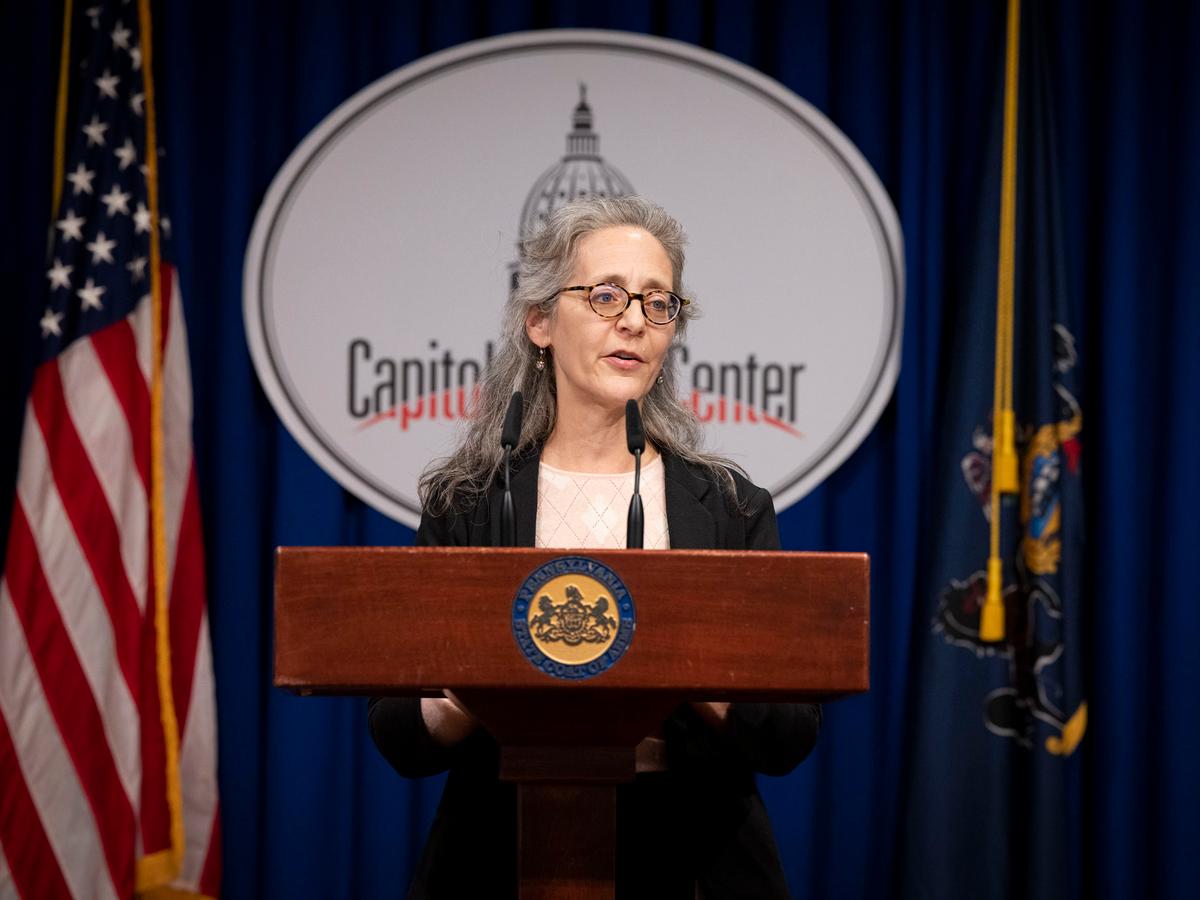Pennsylvania
What’s next for Shapiro’s pick for PA health secretary

Spotlight PA is an independent, nonpartisan newsroom powered by The Philadelphia Inquirer in partnership with PennLive/The Patriot-News, TribLIVE/Pittsburgh Tribune-Review, and WITF Public Media. Sign up for our free newsletters.
HARRISBURG — Seven months into his first term as Pennsylvania’s governor, two of Democrat Josh Shapiro’s picks for top cabinet posts haven’t been confirmed by the state Senate.
In practice, the distinction between an acting and confirmed secretary is minimal. Shapiro’s two acting secretaries, Debra Bogen of the Department of Health and Wendy Spicher of the Department of Banking and Securities, have essentially the same powers as cabinet officials approved by state senators.
But Bogen’s continued service in that role has roiled at least two Republican lawmakers who now want to curtail the powers of acting secretaries.
Shapiro recalled Bogen’s nomination in late June after it became clear she did not have the votes to be confirmed by the GOP-controlled state Senate.
Bogen, a pediatrician, had served as the head of the Allegheny County Health Department during the first years of the COVID-19 pandemic, and Republican leadership attributed the lack of support to Bogen’s “past management work.”
The governor has yet to announce publicly whether he will once again put Bogen before the state Senate for consideration or will nominate someone else to fill the role on a permanent basis.
State Sens. Kristin Phillips-Hill (R., York) and Judy Ward (R., Blair) say that allowing acting secretaries to perform their duties without lawmakers’ approval permits the governor and his cabinet to evade oversight set up in the state constitution. They intend to introduce a constitutional amendment that would limit the powers of such secretaries in September.
“We’re supposed to be three co-equal branches of government and over the last three years we’ve seen the executive branch gain power,” Phillips-Hill told Spotlight PA. “The advice and consent of the Senate in a governor’s cabinet official is something that is articulated in our constitution.”
Shapiro isn’t the only governor who has made use of acting secretaries. At the end of former Gov. Tom Wolf’s administration, over one-third of the state’s agencies were led by officials who never received state Senate approval.
Wolf’s former press secretary, J.J. Abbott, said the governor wasn’t trying to circumvent the state Senate. He told Spotlight PA it was always a challenge to recruit officials for short cabinet stints late in an administration, and the long approval process didn’t help. But more importantly, he said, he blames the state Senate for injecting politics into the process.
He noted that leaders at one point tried to block appointments to the state utility regulator over a legislative conflict — something Abbott called “the straw that broke the camel’s back” in terms of getting nominees confirmed.
“They screwed up things with Wolf by turning things from [the state Senate’s constitutional duty of] ‘advise and consent’ to a ransom-taking,” he said.
The 21 cabinet secretaries who require state Senate approval lead state agencies, advise the governor, and recommend policy. Their responsibilities are wide-ranging and include administering the state’s elections, directing billions of dollars in education funds, and deploying state and federal dollars for a slew of human services programs, like SNAP and Medicaid.
The state’s constitution directs the governor to nominate a secretary to fill a position within 90 days of its vacancy.
Following the nomination, the state Senate has 25 legislative days to vote on the nominee, who needs approval from two-thirds of the body in order to be confirmed. If the nomination occurs during a recess, the clock starts after the chamber reconvenes.
If the state Senate fails to vote on a nomination within those 25 legislative days, the nominee can assume the role as if the body had voted in their favor. This happened for three of the secretaries in Shapiro’s administration — those in charge of the Departments of Human Services, Revenue, and State.
The administration’s two remaining unconfirmed secretaries, in the Departments of Banking and Securities and Health, followed different paths to their current acting statuses.
Shapiro initially nominated Sarah Hammer, executive director at the University of Pennsylvania’s Wharton School, as banking secretary in January. However, Hammer announced in early May that she would be “returning to serve the [University of Pennsylvania] community.”
Following Hammer’s withdrawal, Shapiro nominated Spicher in early July. Prior to her nomination, Spicher had served as the deputy secretary for depository institutions in the Department of Banking and Securities since 2008. As of Aug. 17, the state Senate had 24 legislative days to vote on Spicher’s nomination.
Bogen, meanwhile, is Shapiro’s original nominee to lead the Department of Health. In late June, Shapiro recalled Bogen’s nomination because there were not enough votes to confirm her.
State Senate Majority Leader Joe Pittman (R., Indiana) said in a statement that “given concerns with Dr. Bogen’s past management work, we felt she was not well suited” to the role. He added the chamber is ready to review a new nominee once Shapiro submits a name for the position.
However, state Senate Minority Leader Jay Costa (D., Allegheny) said he hopes Bogen can resolve some of the differences within the Republican caucus and “get to a place where she will get renominated.”
Costa previously told the Philadelphia Inquirer that some Republican members had issues with Bogen’s time at Allegheny County’s health department “but was not sure of the details.”
“Had her nomination been given the opportunity to get to the floor to the vote, I believe she would have been confirmed,” Costa told Spotlight PA.
Since recalling her nomination, Shapiro has kept Bogen in her role in an acting capacity. A spokesperson from Shapiro’s office declined to comment on any future plans regarding Bogen’s nomination.
Phillips-Hill and Ward said that their constitutional amendment will explicitly spell out what unconfirmed secretaries can’t do, such as issuing executive orders and promulgating regulations on behalf of the governor.
Phillips-Hill said she saw the need to distinguish the powers of acting secretaries during the pandemic when the Department of Health mandated mask-wearing in public schools and social distancing procedures through executive orders.
Three secretaries who served during the pandemic — Alison Beam, Keara Klineparter, and Denise Johnson — were never confirmed by the state Senate.
“Whether it was masking children in child care facilities and in schools, there were a ton of things that were on a daily basis coming out of the Department of Health and this is a person who’s not been confirmed by the Senate,” Phillips-Hill said.
A proposed constitutional amendment needs to pass both the state House and state Senate in two consecutive sessions, before going to voters to be voted up or down in a statewide referendum.
Pat Christmas, the policy director of the good-government group the Committee of 70, said he is unsure that the constitutional amendment will solve any problems.
Christmas said he has yet to see any bill language, but he believes that the lack of confirmations under Wolf’s administration was primarily caused by increased partisanship and a polarized political environment rather than a flaw in the state constitution’s confirmation process.
It isn’t clear, he said, if the constitution needs to be amended to solve such an issue.
“Every change we make to the structure of government — and in this case how the legislature has some oversight authority over the executive — we need to weigh it very carefully,” Christmas said.
Spotlight PA’s Katie Meyer contributed reporting.
WHILE YOU’RE HERE… If you learned something from this story, pay it forward and become a member of Spotlight PA so someone else can in the future at spotlightpa.org/donate. Spotlight PA is funded by foundations and readers like you who are committed to accountability journalism that gets results.

Pennsylvania
Bristol Borough community in Pennsylvania is shaken after 3 family members killed by Amtrak train

Watch CBS News
Be the first to know
Get browser notifications for breaking news, live events, and exclusive reporting.
Pennsylvania
Storms with heavy and wind topple trees, close schools around New Jersey, Pennsylvania

Watch CBS News
Be the first to know
Get browser notifications for breaking news, live events, and exclusive reporting.
Pennsylvania
3 family members fatally struck by Amtrak train in Bucks County, Pennsylvania

Watch CBS News
Be the first to know
Get browser notifications for breaking news, live events, and exclusive reporting.
-

 News1 week ago
News1 week agoTrump Is Trying to Gain More Power Over Elections. Is His Effort Legal?
-

 News1 week ago
News1 week agoCompanies Pull Back From Pride Events as Trump Targets D.E.I.
-

 Politics1 week ago
Politics1 week agoTexas DOGE bill passes Senate to streamline state regulations
-

 News1 week ago
News1 week agoFederal judge who drew Trump's anger picks up new case against administration
-

 World1 week ago
World1 week agoUS Army says vehicle of four missing soldiers found in Lithuania
-

 News1 week ago
News1 week agoLeShon Johnson, Ex-N.F.L. Running Back, Ran Major Dogfighting Kennel, U.S. Says
-

 Sports1 week ago
Sports1 week agoStraight Outta L.A.: Ice Cube's new BIG3 team is the Riot and 'here to shake things up'
-

 Technology1 week ago
Technology1 week agoSome Kindles now let you double-tap anywhere to turn the page















